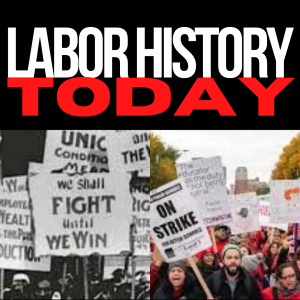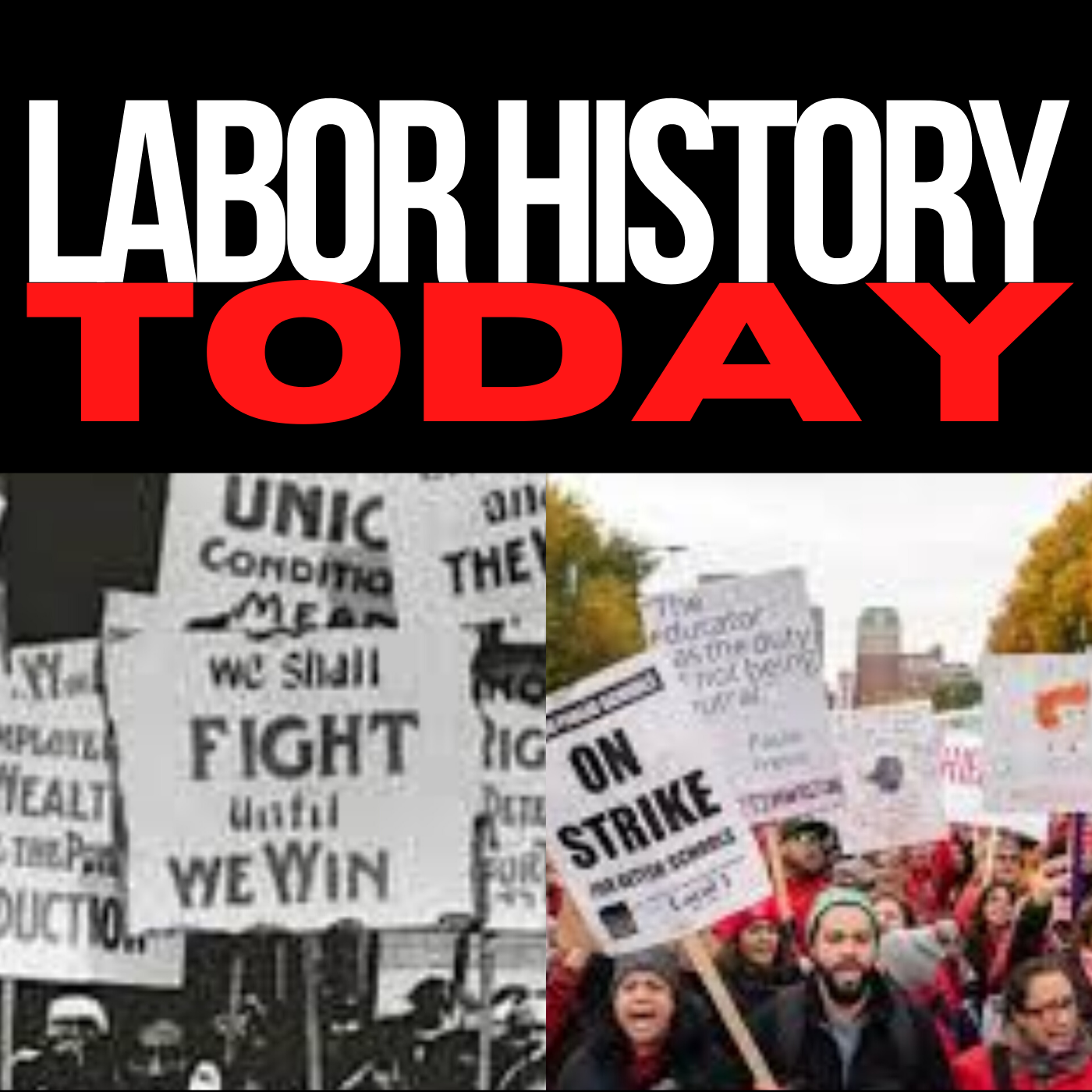Episodes
Episodes



Monday Jun 13, 2022
“We Remember You”; the AFL-CIO’s tribute to Rich Trumka
Monday Jun 13, 2022
Monday Jun 13, 2022
Highlights from the June 11 tribute at the AFL-CIO Convention to Richard L. Trumka, the fiery Mine Workers president who led his union to victory in the historic 1989 Pittston strike, and went on to lead the AFL-CIO, serving as president from 2009 until his untimely death on August 5, 2021.
On Labor History in 2:00: “Team Owners Attack Free Agency”.
Got a questions, comments or suggestions welcome, and to find out how you can be a part of Labor History Today, email us at LaborHistoryToday@gmail.com
Labor History Today is produced by Union City Radio and the Kalmanovitz Initiative for Labor and the Working Poor. Hosted and produced by Chris Garlock.
#LaborRadioPod #History #WorkingClass #ClassStruggle @GeorgetownKILWP #LaborHistory @UMDMLA @ILLaborHistory @AFLCIO @StrikeHistory #LaborHistory #AFLCIOConv



Sunday Jun 05, 2022
Sunday Jun 05, 2022
From the Tales from the Reuther Library podcast, Dr. Krysta Ryzewski explains how historical archaeology digs at famous Detroit locales – including the Little Harry speakeasy, the Blue Bird Inn, and the Grande Ballroom – have clarified how underrepresented communities of Detroit experienced and responded to the Great Migration, changing economic forces, and a shifting political and social landscape in the 20th century. Ryzweski is an associate professor and chair of the Anthropology Department at Wayne State University, and author of Detroit Remains: Archaeology and Community Histories of Six Legendary Places.
On Labor History in 2:00: “The Big One”; GM workers in Flint, Michigan walk off the job in 1998.
Got a questions, comments or suggestions welcome, and to find out how you can be a part of Labor History Today, email us at LaborHistoryToday@gmail.com
Labor History Today is produced by Union City Radio and the Kalmanovitz Initiative for Labor and the Working Poor. Hosted and produced by Chris Garlock.
#LaborRadioPod #History #WorkingClass #ClassStruggle @GeorgetownKILWP #LaborHistory @UMDMLA @ILLaborHistory @AFLCIO @StrikeHistory #LaborHistory @ReutherLibrary



Sunday May 29, 2022
The Memorial Day Massacre
Sunday May 29, 2022
Sunday May 29, 2022
(Originally released May 27, 2018)Labor historians Joe McCartin, Ben Blake and Julie Greene remember the 1937 Memorial Day Massacre, when police opened fire on striking steelworkers at Republic Steel in South Chicago, killing ten and wounding more than 160.
Patrick Dixon interviews Tom Sito on the 1941 strike by animators against Walt Disney. Sito, a well-known American animator (Who Framed Roger Rabbit, The Lion King, Shrek and many more), animation historian and teacher, is the author of “Drawing the Line: The Untold Story of the Animation Unions from Bosko to Bart Simpson.”
And in this week’s Labor History Object of the Week we take a look at a United Farm Worker banner commemorating the 1965 strike against grape growers in California. The banner is part of the exhibit “For Liberty, Justice, And Equality: Unions Making History In America” at the George Meany Labor Archives at the University of Maryland College Park campus.
Plus we’ve got music by Joe Glazer, the Eureka's, Willie Sordill and Joan Baez.
Union City Radio's Chris Garlock hosts.
Joe McCartin is professor of history at Georgetown University and Executive Director of the Kalmanovitz Initiative for Labor and the Working Poor.Julie Greene is a historian of United States labor, immigration, and empire; she teaches at the University of Maryland. She is the author of The Canal Builders: Making America's Empire at the Panama Canal (Penguin Press, 2009).Benjamin Blake works at the University of Maryland, where he’s a labor archivist at the George Meany Labor Archives.Chris Garlock, Union Cities Coordinator for the Metro Washington AFL-CIO, hosts Union City Radio on WPFW 89.3FM.
Questions, comments or suggestions welcome, and to find out how you can be a part of Labor History Today, email us at LaborHistoryToday@gmail.com
Labor History Today is produced by Union City Radio and the Kalmanovitz Initiative for Labor and the Working Poor. Engineered by Chris Garlock.
Labor history sources include Today in Labor History, from Union Communication Services unionist.com/
This week's music:Memorial Day Massacre - Joe Glazer2006 Smithsonian Folkways Recordings / 1975 Collector Records
Union Thru and Thru -- the Eureka'sRob Mitchell and Ken Walther (c) Walther Music
Talking U.F.W. · Willie SordillWhat Now People?, Vol. 2℗ 2004 Smithsonian Folkways Recordings / 1977 Paredon Records
No nos moveran - JOAN BAEZ



Sunday May 22, 2022
Forced labour during the ”Dirty Thirties”
Sunday May 22, 2022
Sunday May 22, 2022
Featuring archival audio interviews and labour songs of the time, our show this week examines the forced labour relief camps the Federal Government of Canada set up in response to the so-called "Dirty Thirties" or "Great Depression." The show comes from On the Line: Stories of BC Workers, a terrific labor history podcast put out by the BC Labour Heritage Centre.
On Labor History in 2:00: The 1934 “Battle of Deputies’ Run,” and Chicago’s first teachers’ strike, in 1969.
Got a questions, comments or suggestions welcome, and to find out how you can be a part of Labor History Today, email us at LaborHistoryToday@gmail.com
Labor History Today is produced by Union City Radio and the Kalmanovitz Initiative for Labor and the Working Poor. Hosted and produced by Chris Garlock.
#LaborRadioPod #History #WorkingClass #ClassStruggle @GeorgetownKILWP #LaborHistory @UMDMLA @ILLaborHistory @AFLCIO @StrikeHistory #LaborHistory @BC_LHC



Sunday May 15, 2022
Blood, guts, and organizing
Sunday May 15, 2022
Sunday May 15, 2022
On the brand-new Ironworkers Rising podcast, hosts Anna Woodbury and Ron Gray talk with Rich Rowe and Charlie McCollester, iron workers who got bitten by the labor history bug. Drawing on Rich and Charlie’s extensive experience and knowledge as educators, historians and activists, they discuss historical events such as the Haymarket Square Massacre, the Homestead Strike and more.On Labor History in 2:00: The year was 1942. The labor movement lost one of its prolific voices. T Bone Slim was born Matti Valentinpoika Huhta in Ashtabula Ohio.
Questions, comments or suggestions welcome, and to find out how you can be a part of Labor History Today, email us at LaborHistoryToday@gmail.com
Labor History Today is produced by Union City Radio and the Kalmanovitz Initiative for Labor and the Working Poor. Hosted and produced by Chris Garlock.
#LaborRadioPod #History #WorkingClass #ClassStruggle @GeorgetownKILWP #LaborHistory @UMDMLA @ILLaborHistory @AFLCIO @StrikeHistory #LaborHistory @IWOrganizing



Sunday May 08, 2022
The Haymarket Martyrs Monument: Past, Present, Future
Sunday May 08, 2022
Sunday May 08, 2022
Someone threw a bomb into the police ranks, who then opened fire on the unarmed crowd, creating a melee of blood and bullets. Within five minutes, the calamitous event was over.“The calamitous event” was the 1886 Haymarket Square Massacre – or the Haymarket Riot, depending on who you’re talking to. As part of the virtual public event "Monumental Labor: Justice Denied, Injustice Remembered," Dr. Melissa Dabakis examines the history of the Haymarket Square bombing. The series was organized by NPS Mellon Humanities Fellows Dr. Eleanor Mahoney and Dr. Emma Silverman, and was made possible by the National Park Service in part by a grant from the National Park Foundation and the Andrew W. Mellon Foundation.On Labor History in 2:00: The year was 1937. That was the day animators struck Fleischer Studio in New York City. It was the industry’s first strike. Music by Jay Kulstad: Haymarket Massacre.
Questions, comments or suggestions welcome, and to find out how you can be a part of Labor History Today, email us at LaborHistoryToday@gmail.com
Labor History Today is produced by Union City Radio and the Kalmanovitz Initiative for Labor and the Working Poor. Hosted and produced by Chris Garlock.
#LaborRadioPod #History #WorkingClass #ClassStruggle @GeorgetownKILWP #LaborHistory @UMDMLA @ILLaborHistory @AFLCIO @StrikeHistory #LaborHistory @NatlParkService @elbertscube



Sunday May 01, 2022
We Mean to Make Things Over: A History of May Day
Sunday May 01, 2022
Sunday May 01, 2022
We Mean to Make Things Over: A History of May Day is a new half-hour documentary video written and directed by Fred Glass, a labor historian (check out his book Mission to Microchip: A History of the California Labor Movement) and retired union communications director. Fred is a member of the Democratic Socialists of America (DSA) East Bay chapter and was recently elected a member of the California DSA State Committee. Elise Bryant and I -- joined by labor historian Joe McCartin -- talk with Fred about the origins of May Day and about the future of the fight for economic justice, and today’s show features clips from Fred’s terrific film.
Also, the 2022 DC LaborFest/DC Labor FilmFest opens today and runs throughout the month of May, with a DC labor history walk, as well as films and music about work and workers. Music by Tom Morello (Union Town).
Questions, comments or suggestions welcome, and to find out how you can be a part of Labor History Today, email us at LaborHistoryToday@gmail.com
Labor History Today is produced by Union City Radio and the Kalmanovitz Initiative for Labor and the Working Poor. Hosted and produced by Chris Garlock.
#LaborRadioPod #History #WorkingClass #ClassStruggle @GeorgetownKILWP #LaborHistory @UMDMLA @ILLaborHistory @AFLCIO @StrikeHistory #LaborHistory @fglass57 @tmorello



Sunday Apr 24, 2022
The death of “Big Steve” Sutton
Sunday Apr 24, 2022
Sunday Apr 24, 2022
Workers Memorial Day takes place annually around the world on April 28, an international day of remembrance and action for workers killed, disabled, injured, or made unwell by their work. “Big Steve” Sutton was one of those workers, killed on July 18, 1932 near the Marseilles dam on the Illinois River in Marseilles, Illinois. This Thursday, on Workers Memorial Day, a historical marker for “Big Steve” and the 21 other workers injured on that day, will be dedicated in Marseilles. On today’s show, we’ll find out who “Big Steve” was, and why we remember his death and the struggles of his fellow workers all these years later. Our guide is Michael Matejka, a labor historian and journalist, who spoke with co-hosts Chris Garlock and Ed Smith on the Your Rights At Work radio show on WPFW 89.3FM last week. Find out more from the Illinois Labor History Society; music by Tom Morello (Night Falls).
Also on today’s show, a double shot of Labor History in 2:00: The California Spinach Riot (1937) and The Deadly Cost of Fashion (2013).
Questions, comments or suggestions welcome, and to find out how you can be a part of Labor History Today, email us at LaborHistoryToday@gmail.com
Labor History Today is produced by Union City Radio and the Kalmanovitz Initiative for Labor and the Working Poor. Hosted and produced by Chris Garlock.
#LaborRadioPod #History #WorkingClass #ClassStruggle @GeorgetownKILWP #LaborHistory @UMDMLA @ILLaborHistory @AFLCIO @StrikeHistory #LaborHistory @tmorello




